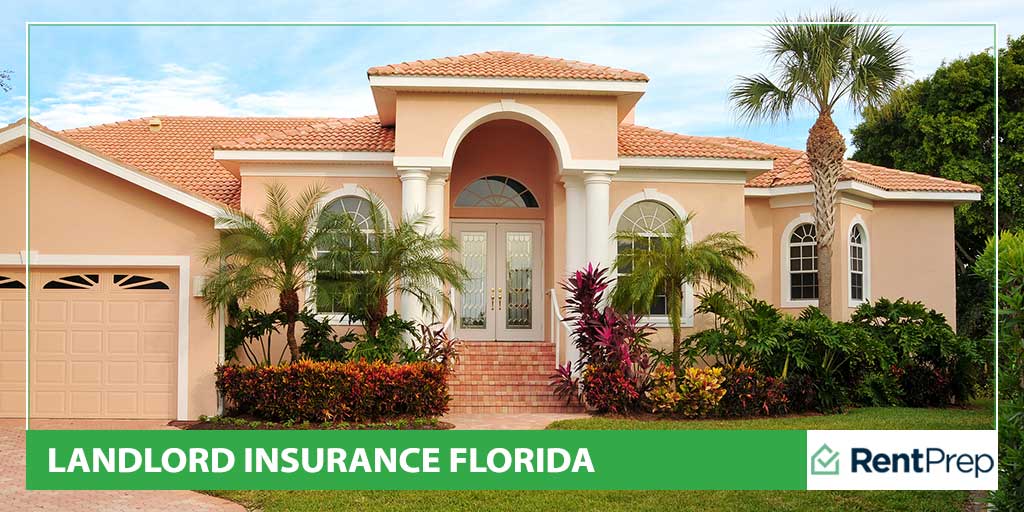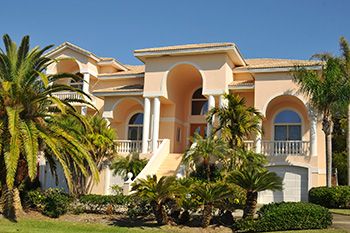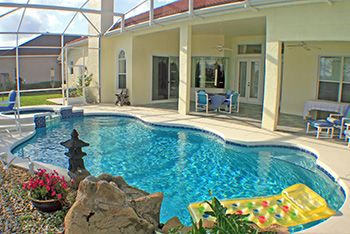
Nearly 15 percent of Florida’s population are renters, and there are thousands of landlords working to keep housing available. Florida is also one of the states with the highest occurrence of natural disasters, meaning landlord insurance in Florida is an essential investment.
If you’re a landlord working in Florida without rental property insurance, you could be at risk of significant losses and huge expenses. Damages are costly, and many rental properties will need some repairs due to natural phenomena each year. What are you doing to protect your bottom line from these uncontrollable factors?
Property insurance may be a costly investment, but it’s also one you should consider when managing rentals in sunny Florida. Today, learn about why you might want property insurance, what it typically covers, and how you can save money while still protecting your investments.
Table Of Contents: Florida Landlord Insurance
High insurance rates in Florida lead some landlords to avoid coverage altogether, but most investors would advise against this. Learn all about this insurance type and whether or not it suits your needs in today’s complete guide:
- What Is Landlord Insurance In Florida?
- What Is Covered By Rental Property Insurance In Florida?
- Lowing The Cost Of Landlord Insurance In Florida
- FAQs: Landlord Insurance In Florida
- Do You Need Rental Property Insurance In Florida?
What Is Landlord Insurance In Florida?

Landlord insurance, also known as rental property insurance, is a type of policy intended for landlords renting properties to tenants. Many states, including Florida, do not require landlords to carry this insurance.
However, many experienced landlords have found that rental property insurance coverage can make a huge difference in profits because it protects you from excessive financial damage caused by:
- Legal liability issues
- Fire damage
- Water damage
- Natural disaster damage
- Property damage to landlord’s belongings on a rental property
Landlord insurance covers those renting out properties, including apartments, condos, or residential homes. You need to have this type of protection from financial loss when your profits depend on the habitability of your investment properties. Without it, you leave yourself open to excessive risk.
There are many types of landlord insurance, and the coverage varies by a specific policy. You can mix and match coverage to suit your business needs and budget.
Homeowners Insurance vs. Landlord Insurance
There can be some confusion between homeowners insurance and landlord insurance. After all, don’t landlords typically own the properties they are renting out?
Which coverage is suitable for your situation comes down to a few particulars of the rental and living situation associated with a property.
- Does the insured individual live on the property?
- Homeowners insurance: Yes, with or without a tenant
- Landlord insurance: Typically no, though some owner-occupied properties are included in this coverage
- Does the policy cover the building and other structures on the property?
- Homeowners and landlord insurance: Yes
- Does the policy cover personal property?
- Homeowners insurance: Yes, covers most personal property of the owner
- Landlord insurance: No, only covers some of the landlord’s personal property located at the property; does not cover tenant property
These are just some of the differences between these two types of insurance. The major differences are related to how you use the property. Homeowners insurance is intended to protect and insure owner-occupied properties, while landlord insurance is geared toward coverage that protects your investments.
Landlord Insurance vs. Renters Insurance
Another type of insurance that you will come across while working as a landlord is renters insurance. Renters insurance is a type of policy carried by tenants to cover their personal belongings and any damages caused to the property by the tenant or their guests.
What Is Covered By Rental Property Insurance In Florida?
Rental property insurance in Florida covers many different types of situations. Remember, of course, that the exact coverage included in a policy is determined by its specific terms. These are just some examples of common coverage types.
Typically, insurance policies for landlords include damages and financial loss caused by the following:
- Fire
- Lightning
- Earthquakes
- Storms and hail
- Hurricanes
- Floods
- Water leaks
- Broken pipes and appliance leaks
- Oil leaks
- Theft and robbery
- Malicious damage by third-party
- Injuries at the property
There are also many types of coverage commonly offered as optional add-ons, including:
- Malicious damage by tenant
- Legal liability issues
- Accommodation cost coverage when tenants need to be relocated
- Rent guarantee to cover lost rent
- Property contents insurance
- Terrorism and other issues not included in standard insurance coverage
- Riot and civil commotion coverage
Exclusions From Rental Property Insurance

It’s essential to not only understand what is typically covered by landlord insurance but also to understand what is not likely to be covered. These are some of the most common exclusions seen on landlord insurance policies.
Renter Belongings
Tenant personal property is typically not insured by landlord-held policies. Landlords may require tenants to get their own renters insurance to protect their belongings so they are not held liable. If the landlord is responsible for these damages, add-on coverage for liability will help benefit and cover the tenants for any losses.
Equipment And Appliance Maintenance
While the insurance policy may cover damages caused by an appliance leak or other equipment malfunction, it will not cover the cost of fixing or replacing the appliance. Replacing an air conditioning unit is the landlord’s responsibility and will not be covered as an insurance benefit.
Owner-Occupied Properties
Some insurance companies will not cover a property with landlord insurance if it is owner-occupied. For example, if you rent out part of your home to a tenant, you may need to rely on homeowners insurance rather than landlord insurance. Talk to your insurance company about specifics to ensure you know your coverage type.
Lowing The Cost Of Landlord Insurance In Florida
Florida property damage can cost landlords a lot to repair, but some feel that rental property insurance is also too expensive. How can you navigate this financial balance?
The best thing you can do is find ways to lower the cost of your insurance. Here are ideas on what might help to reduce the costs associated with rental property insurance.
Prepare For Inspection
Most insurance companies require property inspections, focusing on the roof, electrical, plumbing, and HVAC systems. If you have known problems in these areas, fix them before the inspection.
Mitigate Storm And Wind Damage
A certified weather specialist can help provide recommendations on your property to help lower insurance costs. Implement some of their suggestions and report these changes to the insurance company. They may lower rates as these mitigation techniques will help to reduce repair costs.
Higher Deductible
By raising your deductible, you can pay a lower monthly premium. While this means that you may need to pay for more minor repairs, you will still have good coverage in the event of extensive damage.
Lowering Tenant Risk With Screening
Tenant risk is a factor that will play into the cost of repairs and insurance rates. Insurance companies do inspections to provide current rates. If you’re housing risky tenants who are not taking care of the property, this could lead to higher rates. Even if it doesn’t come into play, your repair costs will likely increase.
Prevent these extra costs by ensuring that your tenant screening process is thorough and effective. Screening ensures that you are choosing reliable tenants likely to treat your property with respect, and that’s incredibly important.
If you aren’t sure how to improve your screening practices, working with a third-party tool may be the perfect solution. Our screening at RentPrep enables you to efficiently run tenant background checks, credit reports, and credit checks. Get started with a complete screening with us today!
FAQs: Landlord Insurance In Florida
How much is landlord insurance in Florida?
The exact size and location of the property will determine the final cost of landlord insurance in Florida. Additionally, how much coverage you choose can drastically change how much needs to be spent on coverage.
Generally, rental property insurance is around 20 percent more than homeowner’s insurance. This is due to the added liability of tenants and potential property damage.
Additionally, Florida insurance rates are generally higher than other states because of the increased risk of storm damage. The average annual insurance cost in Florida is around $2,400, while the national average is about $1,700.
Is landlord insurance required in Florida?
Florida does not require landlord insurance. However, most investors agree that having at least some rental property coverage is essential to protect the future of your business. Coverage helps protect you from natural disasters and liability issues, and insurance coverage can even help provide relocation costs for tenants if a property is severely damaged.
Without this type of coverage, it will fall to your business to cover these costs while also doing repairs, which can be a substantial financial hit. Having at least some type of coverage while doing rental investment work in a state with volatile weather like Florida is highly recommended for all landlords.
Is landlord rental insurance worth it?
Most investors agree that landlord rental insurance is a great financial choice. Paying for insurance coverage isn’t very expensive, especially compared to the potential benefits of having it in place.
When faced with huge costs due to storm damage, liability issues, or tenant risk, the right coverage could keep you from needing to front all that money. Instead, you’ll be able to file claims to keep your business proceeding smoothly even when these frustrating situations arise.
Of course, you should always analyze how much coverage you need and the most essential coverage types. The exact location of your property, its age, and the amount of capital you have will play a role in determining your coverage selection. Having at least some type of insurance, however, is very important for landlords.
How can I reduce my landlord insurance?
Reducing the cost of your landlord insurance is possible if you are willing to reduce coverage, change companies, or make improvements to the property to mitigate risk factors.
First, consider reducing the amount of coverage that you have in place. Most landlords will agree that it would be great to have every type of coverage possible, but that simply isn’t smart or affordable in all cases. Consider the types of risks that are greatest to your property and keep coverage only for those issues.
Next, consider changing insurance companies. Shopping around can help you find better rates, and your current insurer might even be willing to provide a discounted rate if you tell them you’ll be switching companies.
Finally, find ways to reduce the unique risks of your property. Insurance companies will often offer better rates on properties with wind mitigation set up as this lowers the risk of damages. Additionally, companies may reward landlords with limited personal property at the rental, reducing the overall amount that will need to be covered.
Finding the perfect solution when figuring out how to handle your rental property insurance in Florida can take time, but the time invested is worth the rewards.
Do tenants need renters insurance in Florida?
Florida law does not require tenants to have renters insurance in the state, but you, as a landlord, are permitted to require this type of insurance. Some landlords choose to require renters insurance to protect their personal property while also ensuring that tenants will not try to make claims through the landlord.
Additionally, tenants’ insurance covers damages to the rental caused by the tenant or their guests, so you can have peace of mind that your property will be returned in good condition, even in situations caused by tenants. Requiring tenant insurance helps set up the right situation for limited damages and covers repairs from start to finish, no matter the situation.
Do You Need Rental Property Insurance In Florida?
There’s no doubt that working as a landlord in Florida can be incredibly profitable, but you can also face severe natural disasters that leave you and your tenants struggling. Without the correct property insurance, you could need to cover repairs, temporary housing for tenants, and much more if damage occurs.
Having good landlord insurance coverage in Florida can protect you and your properties from:
- Storm damage
- Fire damage
- Personal injury suits
- Burst pipes
- … and much more!
The value of landlord insurance in Florida is hard to miss, but you should always choose the exact coverage based on what your business can afford and what your property needs. Research your options thoroughly before proceeding to ensure you don’t overextend your insurance spending.

